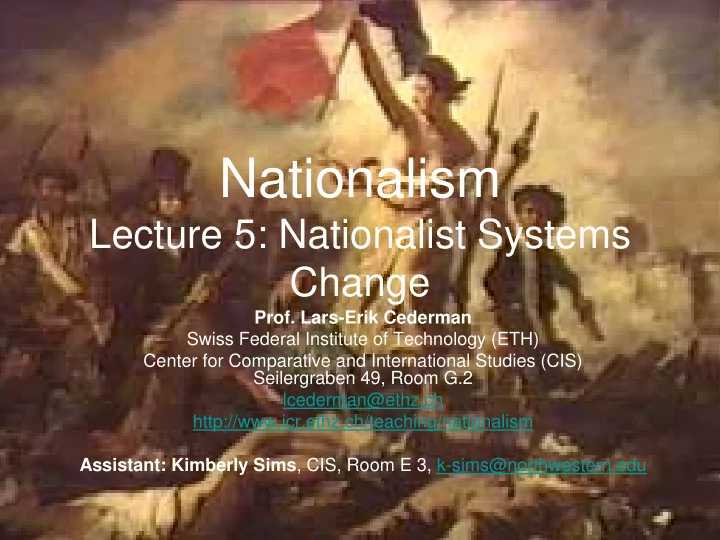

Nationalism Lecture 5: Nationalist Systems Change Prof. Lars-Erik Cederman Swiss Federal Institute of Technology (ETH) Center for Comparative and International Studies (CIS) Seilergraben 49, Room G.2 lcederman@ethz.ch http://www.icr.ethz.ch/teaching/nationalism Assistant: Kimberly Sims , CIS, Room E 3, k-sims@northwestern.edu
Three types of change Source: R. Gilpin: War and Change in World Politics Type Factors that change Examples Systems change Nature of actors empires, nation-states... Systemic change Governance of system polarity, rules of conduct Interaction change Interstate processes war, alliances • Two types of systems change: – State-formation – Nation-building
Otto Hintze: • “ States are created by war, colonization, conquest and peaceful settlement, through amalgamation of different parts and through their separating from each other; and all this is bound up with an alternating process of intermingling and separation of races and civilizations, and languages. The European peoples have only gradually developed their nationalities; they are not a simple product of nature but are themselves a product of the creation of states. ”
Lords and vassals Peasants Kings Feudal Europe Church Emperor
Feudalism • Indirect rule • Private possession of means of violence • Lack of distinction between private and public property => Violation of sovereignty conditions – internal – external – boundary
Alternative Political Orders The Italian City- States City Leagues like the Hansa
Emergence of the territorial state in early modern Europe • Institutional legacy • Warfare • Improved communications • Doctrinal innovations – Renaissance – Reformation – Sovereignty Thomas Hobbes Louis XIV
Early Modern Europe Diplomacy & Interstate Warfare Relations Descending sovereignty States
The Westphalian Model • Peace of Westphalia of 1648 after 30 years’ war: – Territorial state confirmed – Legal equality – Non-interference – Compensation
Nationalist Systems Change Irredentism Interstate Relations States Ascending sovereignty Nations
The evolution of sovereignty Post- Post-WWI Post-WWII Post-Cold War? Napoleonic Problem as Napoleon’s Failure of balance Hitler’s Communist seen by unrestrained of power nationalistic repression of victor nationalism excesses democracy and HR New —Balance of —Wilson’s 14 —bipolarity —democracy Principles power points —strategic —human/minority —State —national self- stability rights legitimacy determination —non- —Dynastic —collective interference intervention security (L of N) (UN) Result —restoration —imperial —divided states —multi-national —Concert breakup —stability and states undermined —long peace —plebiscites balance of power —German ==> IR idealism ==> realism reunification —ethnic conflict Contradic- waves of —new states —decolonization —EU, S. Africa tions nationalist fragmented —latent —intervention? revolutions —colonial powers nationalism —US policy to —human rights Iraq Source: Barkin and Cronin
Recommend
More recommend